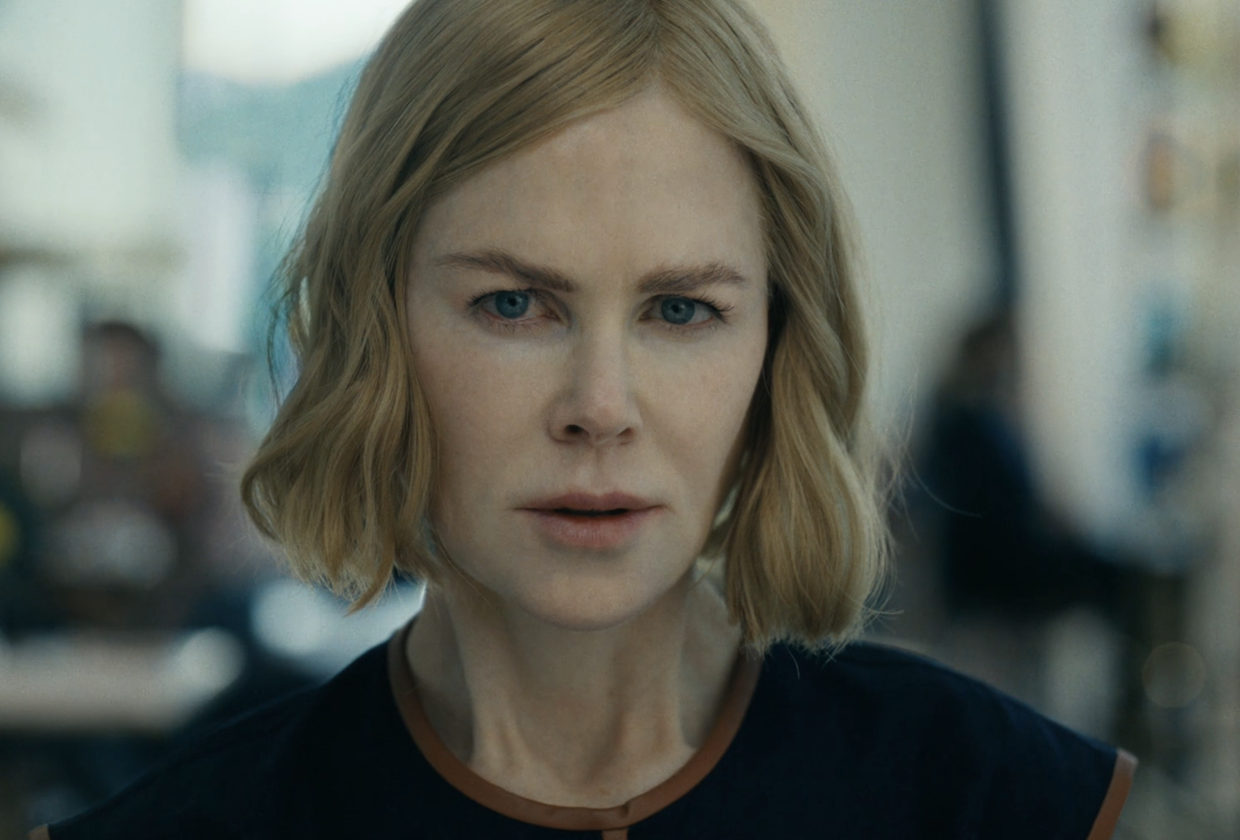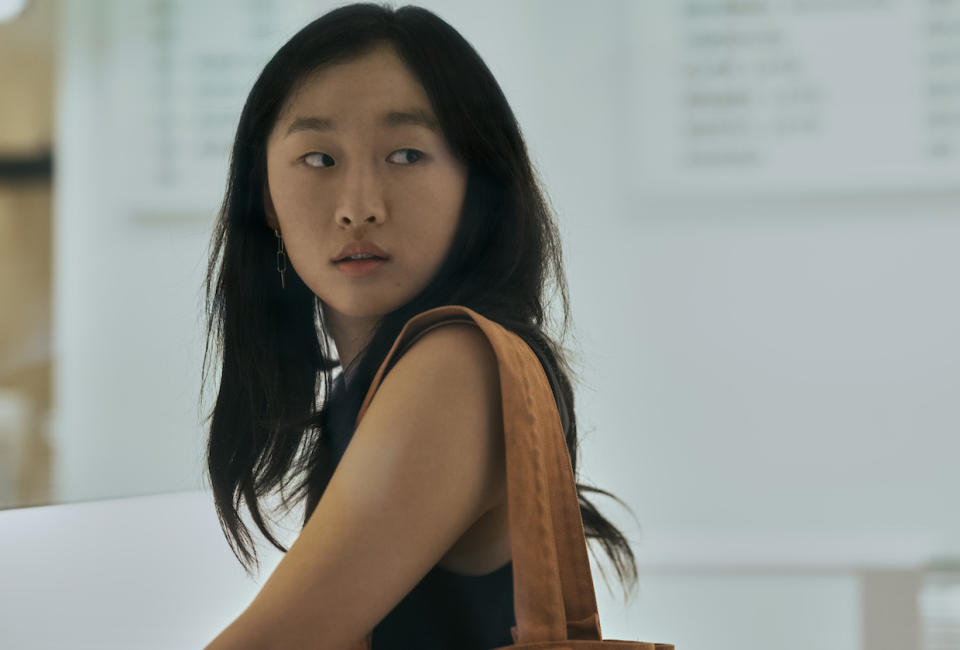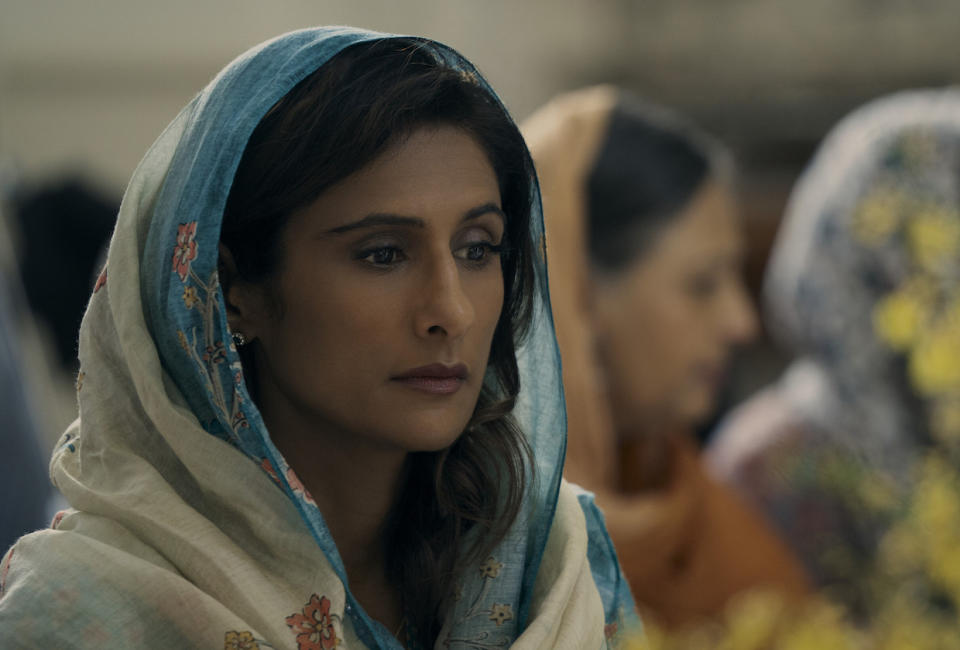Expats Finale: Creator Lulu Wang Talks Pathos of Mercy and Margaret’s Futures: ‘Sometimes Life Is Outside of Our Control’

In the series finale of Prime Video’s Expats, Margaret, Hilary and Mercy finally came to terms with the weight of their individual traumas, and the complicated and sometimes brutal roles they played in each others’ lives.
When the three women met face to face, Margaret announced that her family was moving back to the States in order to help her other two children move on. And while Hilary reflected on healing from her father’s death and his abuse against her mother throughout her childhood, Mercy timidly faced motherhood, as she continued to struggle with her own grief stemming from losing Gus in that crowded night market. With Gus still missing, Margaret decided at the last minute to stay in Hong Kong without her family in order to keep hope alive that one day her son may be found and returned to her.
More from TVLine
Noel Fielding Talks His New Apple TV+ Comedy Dick Turpin - and If Baking Show Fans Will Get the Joke
The Rookie Star Talks 'Adorable' #Chenford Scene in Episode 100 - Plus, Scoop on Aaron's 'Misstep'
Despite the lack of resolution for Margaret’s family, there are still plenty of keynotes that the cast and its creator Lulu Wang hope audiences will take away from this very real and heartbreaking story of perseverance.
“I think the big takeaway for me is growing up,” says Sarayu Blue (who plays Hilary). “There’s so much loss in this show, there’s so much grief, but there’s such growth that comes of it. It’s that growing up and that resilience that is palpable. The end for all these women is the growth, the moving forward. The ‘what’s next?’ It’s, ‘How do I go through life this way?'”
“Forgiveness and healing is a journey,” adds Ji-young Yoo (Mercy). “I think what you’re left with at the end of the show is an understanding that what happens in your life, you carry with you forever, and it will change shape and you can change its shape. But it’s something that you will continue to revisit. It will always be a part of you.”

Below, Wang talks to TVLine about her goals in telling such a complex story, and the impact of Mercy’s guilt, both from her pregnancy and her role in destroying Margaret’s family. Plus, she explains what she hopes resonates with viewers after watching the emotional sixth episode.
TVLINE | Before we dive into the finale, what drew you to this project and why did you decide to take it on?
LULU WANG | I read a beautiful book, “The Expatriates” by Janice Y.K. Lee. Nicole Kidman brought me the book. It was really surreal to be approached by her with this beautiful novel and it was really daunting, but I just love the textures and the tapestry of characters in the novel and that it’s so firmly a female POV, and that it explores character and the inner lives of all these different types of women.
TVLINE | What was your first meeting with Nicole like and why, do you think, she brought it to you specifically?
She had seen The Farewell and she said that she’d been thinking about going to a director. She said, “As soon as I saw The Farewell, I knew immediately that you were it and it can be no one else.” Our first meeting was interesting because I had said no and passed on the project multiple times and she insisted that we meet and have dinner. I was like, “Oh, no, she’s going to try to convince me.” She was just like, “You have to do it. What do you need? Why are you hesitating if you love the book as much as I did?” I explained to her that I really wanted to have full creative control to really explore characters outside of just the expats and outside of just the wealthy and privileged class, that we had to be able to look through a different lens in order to give context to the wealth, to the privilege that these people experience. They all have different types of privilege. Mercy is also an expat, but she doesn’t have the same privileges as Margaret. And Hilary also has her privileges, but she’s a brown woman in an East Asian country, so she also experiences colorism. There are just so many layers and Nicole gave her full support to do that.
TVLINE | The series explores guilt very deeply. How does Mercy’s pregnancy exacerbate her guilt and the weight of her feelings, and where does the finale leave her?
Somebody who feels so responsible for having changed and devastated lives is now responsible for bringing new life into the world. I think Margaret says, “Part of me wishes that you just didn’t exist and here you are adding to the world. Isn’t that ironic?” There was something so poignant about that. Mercy struggles with, “Do I have the right to be happy? Will I ever be able to live my life and not think about what I’ve done?” And yet, she has to carry on and she has to do so with happiness for her child. And so, it’s about holding multiple truths at once. This dark side of her feels like she’s always going to be a perpetrator. She’s always going to be guilty. And yet the question is, “Does she deserve forgiveness?” Or not even forgiveness, does she deserve to live? Does she deserve to have a child who has a mother who isn’t burdened with trauma? Because that’s how it happens. Generational trauma keeps getting passed on. I think we leave her in a place where she is fighting to be happy again for her daughter while also knowing that a big part of her will always be attached to Margaret and to her actions.
TVLINE | At the end of Episode 2, you spend time focusing on the night market at different times of day and really lingering on those frames. What was the reasoning behind that focus?
The market is a character. When something tragic happens in a particular place, that place is now loaded with meaning, with trauma, with significance. I wanted also to represent the pain of what Margaret must be feeling, what everyone must be feeling. We go through so many different stages of grief and just reacting. There’s the shock of it, of course. There’s this sadness, there’s the anger, but it’s also this sense that the world keeps moving on. In the book, it’s described that Gus is swept away by the crowd, like he’s dropped in a river and he’s just gone. That was so haunting to me and I wanted to represent that and show the night market being so empty, so desolate and so dark, and then life happens and somehow that’s even more painful. The fact that life goes on.

TVLINE | Similarly, how important was the city of Hong Kong to the story and the work you created?
Hong Kong is everything. I don’t know that I would have done this show if it wasn’t for the fact that it was in Hong Kong. It feels incredibly significant because there are so many parallels. Hong Kong, as a character, had to have its own resilience challenged. You can’t talk about the ideas of home and belonging without thinking about Hong Kong’s journey and who it belongs to, what it belongs to. The fact that Cantonese is a dying language was so important to me to capture. The loss of culture — the specific cultures and languages and music and food within nations — is tragic. That is so important if we’re going to make a story about diaspora.
TVLINE | What do you hope resonates with viewers after they finish this series?
I hope that rather than jumping immediately to judgments, that they really question their own capacity for empathy — who deserves it and who doesn’t in their mind and who is considered human, who is allowed to just be a human being and have all of the glory and the tragedy of being human. Margaret says this wonderful thing, which is from the book, she says, “Who do we think we are, any of us, to think that we’re immune to tragedy?” The reality is that no matter how much money you have or where you’re from, sometimes life is outside of our control.
Despite the sort of non-resolute ending, I hope that it really speaks to resilience for people who are having a hard time with anything. I hope that it’s hopeful and that even though the world might not give you closure, it might not give you answers, that it leaves you with a sense that you have what it takes inside of you to find that resilience, even if the world doesn’t make it easy.
Best of TVLine
Get more from TVLine.com: Follow us on Twitter, Facebook, Newsletter

 Yahoo News
Yahoo News 
